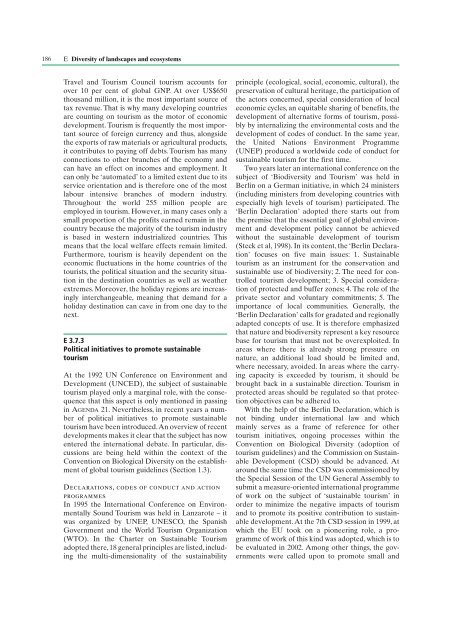Conservation and Sustainable Use of the Biosphere - WBGU
Conservation and Sustainable Use of the Biosphere - WBGU
Conservation and Sustainable Use of the Biosphere - WBGU
You also want an ePaper? Increase the reach of your titles
YUMPU automatically turns print PDFs into web optimized ePapers that Google loves.
186 E Diversity <strong>of</strong> l<strong>and</strong>scapes <strong>and</strong> ecosystems<br />
Travel <strong>and</strong> Tourism Council tourism accounts for<br />
over 10 per cent <strong>of</strong> global GNP. At over US$650<br />
thous<strong>and</strong> million, it is <strong>the</strong> most important source <strong>of</strong><br />
tax revenue. That is why many developing countries<br />
are counting on tourism as <strong>the</strong> motor <strong>of</strong> economic<br />
development. Tourism is frequently <strong>the</strong> most important<br />
source <strong>of</strong> foreign currency <strong>and</strong> thus, alongside<br />
<strong>the</strong> exports <strong>of</strong> raw materials or agricultural products,<br />
it contributes to paying <strong>of</strong>f debts. Tourism has many<br />
connections to o<strong>the</strong>r branches <strong>of</strong> <strong>the</strong> economy <strong>and</strong><br />
can have an effect on incomes <strong>and</strong> employment. It<br />
can only be ‘automated’ to a limited extent due to its<br />
service orientation <strong>and</strong> is <strong>the</strong>refore one <strong>of</strong> <strong>the</strong> most<br />
labour intensive branches <strong>of</strong> modern industry.<br />
Throughout <strong>the</strong> world 255 million people are<br />
employed in tourism. However, in many cases only a<br />
small proportion <strong>of</strong> <strong>the</strong> pr<strong>of</strong>its earned remain in <strong>the</strong><br />
country because <strong>the</strong> majority <strong>of</strong> <strong>the</strong> tourism industry<br />
is based in western industrialized countries. This<br />
means that <strong>the</strong> local welfare effects remain limited.<br />
Fur<strong>the</strong>rmore, tourism is heavily dependent on <strong>the</strong><br />
economic fluctuations in <strong>the</strong> home countries <strong>of</strong> <strong>the</strong><br />
tourists, <strong>the</strong> political situation <strong>and</strong> <strong>the</strong> security situation<br />
in <strong>the</strong> destination countries as well as wea<strong>the</strong>r<br />
extremes. Moreover, <strong>the</strong> holiday regions are increasingly<br />
interchangeable, meaning that dem<strong>and</strong> for a<br />
holiday destination can cave in from one day to <strong>the</strong><br />
next.<br />
E 3.7.3<br />
Political initiatives to promote sustainable<br />
tourism<br />
At <strong>the</strong> 1992 UN Conference on Environment <strong>and</strong><br />
Development (UNCED), <strong>the</strong> subject <strong>of</strong> sustainable<br />
tourism played only a marginal role, with <strong>the</strong> consequence<br />
that this aspect is only mentioned in passing<br />
in AGENDA 21. Never<strong>the</strong>less, in recent years a number<br />
<strong>of</strong> political initiatives to promote sustainable<br />
tourism have been introduced.An overview <strong>of</strong> recent<br />
developments makes it clear that <strong>the</strong> subject has now<br />
entered <strong>the</strong> international debate. In particular, discussions<br />
are being held within <strong>the</strong> context <strong>of</strong> <strong>the</strong><br />
Convention on Biological Diversity on <strong>the</strong> establishment<br />
<strong>of</strong> global tourism guidelines (Section 1.3).<br />
Declarations, codes <strong>of</strong> conduct <strong>and</strong> action<br />
programmes<br />
In 1995 <strong>the</strong> International Conference on Environmentally<br />
Sound Tourism was held in Lanzarote – it<br />
was organized by UNEP, UNESCO, <strong>the</strong> Spanish<br />
Government <strong>and</strong> <strong>the</strong> World Tourism Organization<br />
(WTO). In <strong>the</strong> Charter on <strong>Sustainable</strong> Tourism<br />
adopted <strong>the</strong>re, 18 general principles are listed, including<br />
<strong>the</strong> multi-dimensionality <strong>of</strong> <strong>the</strong> sustainability<br />
principle (ecological, social, economic, cultural), <strong>the</strong><br />
preservation <strong>of</strong> cultural heritage, <strong>the</strong> participation <strong>of</strong><br />
<strong>the</strong> actors concerned, special consideration <strong>of</strong> local<br />
economic cycles, an equitable sharing <strong>of</strong> benefits, <strong>the</strong><br />
development <strong>of</strong> alternative forms <strong>of</strong> tourism, possibly<br />
by internalizing <strong>the</strong> environmental costs <strong>and</strong> <strong>the</strong><br />
development <strong>of</strong> codes <strong>of</strong> conduct. In <strong>the</strong> same year,<br />
<strong>the</strong> United Nations Environment Programme<br />
(UNEP) produced a worldwide code <strong>of</strong> conduct for<br />
sustainable tourism for <strong>the</strong> first time.<br />
Two years later an international conference on <strong>the</strong><br />
subject <strong>of</strong> ‘Biodiversity <strong>and</strong> Tourism’ was held in<br />
Berlin on a German initiative, in which 24 ministers<br />
(including ministers from developing countries with<br />
especially high levels <strong>of</strong> tourism) participated. The<br />
‘Berlin Declaration’ adopted <strong>the</strong>re starts out from<br />
<strong>the</strong> premise that <strong>the</strong> essential goal <strong>of</strong> global environment<br />
<strong>and</strong> development policy cannot be achieved<br />
without <strong>the</strong> sustainable development <strong>of</strong> tourism<br />
(Steck et al, 1998). In its content, <strong>the</strong> ‘Berlin Declaration’<br />
focuses on five main issues: 1. <strong>Sustainable</strong><br />
tourism as an instrument for <strong>the</strong> conservation <strong>and</strong><br />
sustainable use <strong>of</strong> biodiversity; 2. The need for controlled<br />
tourism development; 3. Special consideration<br />
<strong>of</strong> protected <strong>and</strong> buffer zones; 4. The role <strong>of</strong> <strong>the</strong><br />
private sector <strong>and</strong> voluntary commitments; 5. The<br />
importance <strong>of</strong> local communities. Generally, <strong>the</strong><br />
‘Berlin Declaration’ calls for gradated <strong>and</strong> regionally<br />
adapted concepts <strong>of</strong> use. It is <strong>the</strong>refore emphasized<br />
that nature <strong>and</strong> biodiversity represent a key resource<br />
base for tourism that must not be overexploited. In<br />
areas where <strong>the</strong>re is already strong pressure on<br />
nature, an additional load should be limited <strong>and</strong>,<br />
where necessary, avoided. In areas where <strong>the</strong> carrying<br />
capacity is exceeded by tourism, it should be<br />
brought back in a sustainable direction. Tourism in<br />
protected areas should be regulated so that protection<br />
objectives can be adhered to.<br />
With <strong>the</strong> help <strong>of</strong> <strong>the</strong> Berlin Declaration, which is<br />
not binding under international law <strong>and</strong> which<br />
mainly serves as a frame <strong>of</strong> reference for o<strong>the</strong>r<br />
tourism initiatives, ongoing processes within <strong>the</strong><br />
Convention on Biological Diversity (adoption <strong>of</strong><br />
tourism guidelines) <strong>and</strong> <strong>the</strong> Commission on <strong>Sustainable</strong><br />
Development (CSD) should be advanced. At<br />
around <strong>the</strong> same time <strong>the</strong> CSD was commissioned by<br />
<strong>the</strong> Special Session <strong>of</strong> <strong>the</strong> UN General Assembly to<br />
submit a measure-oriented international programme<br />
<strong>of</strong> work on <strong>the</strong> subject <strong>of</strong> ‘sustainable tourism’ in<br />
order to minimize <strong>the</strong> negative impacts <strong>of</strong> tourism<br />
<strong>and</strong> to promote its positive contribution to sustainable<br />
development.At <strong>the</strong> 7th CSD session in 1999, at<br />
which <strong>the</strong> EU took on a pioneering role, a programme<br />
<strong>of</strong> work <strong>of</strong> this kind was adopted, which is to<br />
be evaluated in 2002. Among o<strong>the</strong>r things, <strong>the</strong> governments<br />
were called upon to promote small <strong>and</strong>

















